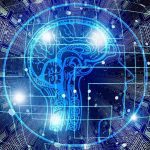Have you put a bet on the FIFA World Cup? If yes, the chances are you've made a pretty educated guess, right? You know which team has the strongest players or most favourable odds. Or maybe you've put some cash on your country's team, (which normally I'd avoid England, but given their recent performance, I could be wrong too!) Either way, you might be best casting your bets … [Read more...] about Predicting A Better Future With Swarm Intelligence
Artificial Intelligence
Learn about the latest developments in artificial intelligence and how it is transforming industries around the world. Our website offers insights and resources for understanding AI and its applications.
AI In Video Games: Taking New Games to the Next Level
In nearly every industry, AI is making a huge splash. AI is helping both marketing and customer support with chatbots assisting customers, as well as helping analyse massive amounts of data, finding new cures and solutions to diseases, helping increase data security, and finding new planets and solar systems in space. The video game industry is no exception to all this AI … [Read more...] about AI In Video Games: Taking New Games to the Next Level
How Artificial Intelligence is changing the Farms of Future
The agricultural sector is one of the most crucial sectors for mankind. With exponentially increasing population and scarcity of resources, the agricultural sector is under constant strain. One thing is clear that traditional methods of farming cannot feed the masses for a long time. There is a need for the agricultural sector to revolutionize. Artificial intelligence has … [Read more...] about How Artificial Intelligence is changing the Farms of Future
Best Machine Learning Tools: Experts’ Top Picks
The best trained soldiers can't fulfill their mission empty-handed. Data scientists have their own weapons ” machine learning (ML) software. There is already a cornucopia of articles listing reliable machine learning tools with in-depth descriptions of their functionality. Our goal, however, was to get the feedback of industry experts. And that's why we interviewed data … [Read more...] about Best Machine Learning Tools: Experts’ Top Picks
Technology in retail: A mid-year review
For some of us listening to music, unwrapping a present, meditating, working out or just a hug contributes tad bit to loosening the levels of stress we go through. While there is an entire another bunch that simply slurp up chocolates that are almost always available in their backpacks as a result of stocking them up being clearly aware of its need in rough times. It's no joke! … [Read more...] about Technology in retail: A mid-year review
What is artificial intelligence (AI)?
AI refers to the development of computer systems that are able to perform tasks that normally require human intelligence, such as recognizing patterns, learning from experience, and problem-solving.
AI systems can be trained to perform these tasks through the use of algorithms and machine learning techniques, which allow them to analyze and interpret data and make decisions based on that analysis. AI has the potential to significantly improve the efficiency and accuracy of many tasks, and is being applied in a wide range of industries and applications.
How is artificial intelligence used?
AI is used in a variety of industries, including healthcare, finance, retail, and transportation, to improve efficiency and productivity.
For example, in healthcare, AI can be used to analyze medical images or electronic health records to identify patterns and make diagnoses, while in finance, it can be used to identify fraudulent activity or optimize investment strategies. In retail, AI can be used to personalize customer experiences or predict demand for products.
What are some examples of artificial intelligence?
Examples of AI include self-driving cars, language translation software, and virtual assistants like Apple’s Siri or Amazon’s Alexa.
Other examples include chatbots that can handle customer service inquiries, predictive analytics tools that can forecast future outcomes, and recommendation engines that can suggest products or content based on user preferences.
What are the potential risks and benefits of artificial intelligence?
AI has the potential to revolutionize industries and improve our daily lives, but it also raises ethical concerns and the risk of job displacement. One concern is the potential for AI systems to perpetuate or amplify biases present in the data used to train them, leading to unfair or discriminatory outcomes.
There is also the risk that AI could be used to automate tasks or make decisions that have negative consequences for humans.
On the other hand, the benefits of AI include improved efficiency and accuracy, the ability to process and analyze large amounts of data quickly, and the potential to tackle complex problems that are difficult for humans to solve.
How can I learn more about artificial intelligence?
Datafloq offers a wide range of AI articles. There are many resources available for learning about AI, including online courses, books, and industry events.
Some popular online courses include those offered by Coursera, edX, and Udacity. There are also many books on AI that provide a broad overview of the field or delve into specific topics, such as machine learning or natural language processing.
Attending industry events, such as conferences or meetups, can also be a great way to learn about AI and network with others in the field. It is important to stay up-to-date on the latest developments in the field, as AI is a rapidly evolving field with many new advances and applications emerging all the time.






